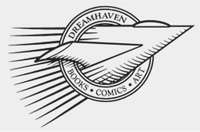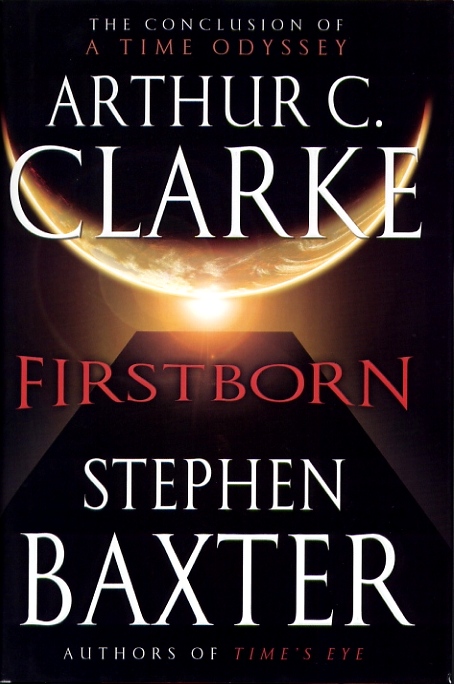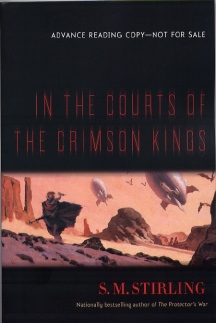|
|
|
|
This Just In...News
From The Agony Column
|
| |
|
12-21-07: Agony
Column Podcast News Report : A Conversation With Greg Ketter, Owner
of DreamHaven Books
|
Extended Shelf
Life
Today's podcast
is an interview with Greg Ketter, a World Fantasy
Award Nominee and the owner of DreamHaven
Books. I've been interviewing publishers and booksellers and Ketter
is both; in fact I have 'Shelf Life' his anthology of bookstore stories,
and a fine book it is. Ketter and I talked about his long strange trip
through the SF&F world – he's been running DreamHaven under
a variety of names for over thrity years – and we touched on
the pros and cons of cons as a means of selling books. Like many booksellers,
Ketter has mixed feelings about the Internet, and we talked about the
unexpected impact on small press sales. You
can hear the MP3 of the interview through this link. You
can buy the books through the Internet, or just call him up. I'd
suggest the latter, which will give you the full benefit of his extensive
experience in the field, experience that is rapidly becoming harder
to find – unless you continue to buy the books from booksellers!
|
| |
|
12-20-07: Agony Column Podcast News Report : A Conversation
With Tim Holman, Editor of Orbit Books
|
Equalizing SF&F
 |
"We do have very much an international perspective on the market," Tim
Holman, the editor of Orbit Books, tells me in our interview. "The
majority of authors are American authors, naturally, but we also have a
fair number of British authors, we have an author from Australia, an author
from New Zealand, we actually have an author we're publishing next season
from Poland..."
Holman and I talked for over half an hour, going far beyond what both of
us expected. If you read science fiction or fantasy and want to know why
you get what you get on the shelves from Orbit – this is your chance
to find out. Here's
a link to the MP3 file. One of the most interesting
aspects of our discussion was Holman's observation that while science fiction
has a high-profile at the box office and on television, it doesn't in the
publishing world. That makes SF publishing a growth market so far as Holman
is concerned, and he's investing in some edgy authors. I asked about the
prevalence of fantasy titles thus far, and he explained that Orbit fantasy
tends to eschew magic, especially the sort of magic that solves literary
problems. But Holman also enthuses about some upcoming SF titles, and the
fact that he sees any sort of genre fiction as a growth market in a publishing
economy that generally has an outlook just shy of dystopian is highly encouraging.
Your chance to hear what's new and next – from the new kid on the
US SF block and an old hand in the SF&F business.
|
| |
|
12-19-07: Arthur C. Clarke & Stephen Baxter Are 'Firstborn'
; Agony Column Podcast News Report : A Christmas Conversation With Jeremy Lassen
|
Damnable Monoliths and Cosmic Cockroaches
|
|
| At
first I thought this was sort of a boring cover, but the
power of the filmic image is irresistable. |
Sunday, December 16, 2007 was the 90th birthday of Sir
Arthur C. Clarke.
It was the kind of milestone that makes me think back on how long I've
been reading the iconic writer's work, and I'm guessing that it's somewhere
around forty years. Like many impressionable adolescents, I was already
reading Clarke when his collaboration with Kubrick to create 2001:
A Space Odyssey was announced. At the time, Ballantine was issuing a series
of mass-market paperback reprints of his work, which I assiduously collected.
These included his collection of humorous stories, 'Tales from the White
Hart' and 'Childhood's End', which in retrospect seems to have provided
some of the themes for 2001: A Space Odyssey. I believe -- though I'm
not certain and can't find the books themselves --- that one of the books
in this series included the short story "The Sentinel," which
was the direct inspiration for 2001. Podcast listeners will note that
Paul Saffo mentioned this story in his interview with me at Singularity
Summit.
There's a kind of classical elegance in Clarke's writing, a Bach-like
clockwork precision. Clarke's visions of a limitless but discoverable
cosmos marked me for life. There's a paradox in his work that is rarely
unpacked. On one hand, Clarke is a rather dry scientist, who values empirical
evidence and technical precision. His work moves carefully from a to
b to c and you can understand each step taken. But that precision and
care is often put in the service of a mind that understands the power
of magic and the imagination. In the same moments that Clarke proceeds
in a smooth manner through the alphabet, he's simultaneously striding
through the universe, using that precise eye to describe vistas of wonder
that are constructed from that basic alphabet on a cosmic scale. He uses
technology to de-construct magic and bring it into the scientific realm
without losing the – magic.
Why Del Rey chose to release it ten days after Clarke's 90th instead of
on the day, I'll never know. But 'Firstborn' (Del Rey / Random House ;
December 26, 2007 ; $25.95), the conclusion to his Time Odyssey series
co-written with Stephen Baxter brings back those pesky monoliths, and it
proves not to be a good thing. It seems that they’re still trying
to destroy mankind, and the whole peace / love deal, what with the Star
Child blowing up the nukes at the end of 2001, well, that was only a ruse.
Having once been foiled, the Firstborn are getting smart and sending something
we just can't comprehend to annihilate us. Good luck. Apparently, we're
the cosmic equivalent of cockroaches.
Baxter's a great match for Clarke, with a mind similarly disposed to both
magic and the machine. His Destiny's Children series had more than a little
of 2001 in it, with a long historical narrative leading into an almost
incomprehensible future. Of course, we're well into our own incomprehensible
future. As I was typing release dates and 90th birthdays and yes, movie
titles, I found myself feeling more than a little wonder. By all rights,
we should be well past the discovery of the first monolith on the moon.
As it happens, perhaps that's a good thing, since the monoliths seem to
be cosmic boots meant to crush cosmic cockroach humanity. Of course, we
don’t have the orbiting nukes, either. Or so we're told.
|
Agony Column Podcast News Report : A Christmas Conversation With Jeremy
Lassen : A Codex Seriphianus Holiday
 |
Today's podcast is a conversation with Jeremy Lassen, publisher of Night
Shade Books. This time around we talked about my great Christmas Desire,
a copy of the Codex Seriphianus. This is a bee that stubbornly stays
in my bonnet no matter how much I postpone the purchase, and I suspect
that I'll eventually fold. Fortunately, it does seem to be a bit to pay
for a book that's written in an invented language, and even more fortunately,
I've never stumbled across a copy in person. That would most likely have
disastrous results.
Jeremy and I do talk about more accessible and affordable titles as well,
and not just the to-die-for, I'm-going-to-buy-one-now limited edition
of 'Perdido Street Station' from his own Night
Shade Books. This podcast
MP3 is definitely rated FD, Financially Dangerous,
and cash-flow sensitive listeners should be very wary. Those who are
finding the space required
to store all the wonderful books you might wish for are also warned in
advance that you'd best be willing to cough up some sacrificial lambs
you're willing to at least pretend you'll give away to make space for
incoming delights. Lambs, by
the by, and limited editions thereof, being a part of our conversation.
Have a Merry and Wary Christmas!
|
| |
|
12-18-07: S. M. Stirling Has a Date 'In the Courts of the
Crimson King' ; Agony Column Podcast News Report: A 2007 Interview with Ann Vileisis
|
Next Stop, Barsoom
Oh my, oh my, does
it get any better? S.
M. Stirling starts with a title
like 'In the Courts of the Crimson Kings' (Tor / Tom Doherty Books ;
March 2008 ; $24.95), and he's got the follow-through to match it. I'd
like to ask my readers to raise their hands if they're currently hearing
reverb-drenched Mellotrons. Good; but don’t worry, it gets better.
Yes, Stirling does pluralize the famous King Crimson song title for a
purpose not to be revealed in any spoilerific prose for this article.
I'm just here to deliver the good news; S. M. Stirling is giving us
a series, a sequel to 'The Sky People', which I suppose we already knew.
Knowing is one thing, but holding the future in your hands is quite another.
Of course, to a certain extent, that's what this book is all about.
What makes 'In the Courts of the Crimson King' so uber-cool? Get beyond
the clever premise and Stirling's effective style. I know you can't forget
the title now that the song is stuck in your brain. But dig this; the novel
starts at the 1962 World Science Fiction Convention, in a room full of
writers who are literally seeing their dreams unfold in front of their
faces, narrated by Walter Cronkite. In 'The Sky People', a Russian spaceship
lands on Venus in '62 only to discover a world of dinosaurs and fur-bikini-clad
cave-babes, pretty much the Edgar Rice Burroughs novels brought to life.
This puzzles them nearly as much as it excites them. Now, with 'In the
Courts of the Crimson King', the US lands on Mars. Fast forward to the
turn of the century, and everyone is everywhere. The heat is on and the
new frontier is wilder than the imaginations of science fiction writers.
Stirling's novel follows Jeremy Wainman who himself is following rakzas,
a sort of giant ostrich pack critter commonly used on Mars. He's an archaeologist,
packing out to the Deep Beyond, hoping to find clues about the Ancients.
He's hired Teyud za-Zhalt, a Martian mercenary who might know more about
those damned Ancients than she lets on. Cue your favorite prog-rock Mellotron
track and wait for the monsters, some of them rather human.
Stirling knows how to have serious fun, to take his own creation seriously
enough so that his characters are not one-dimensional satiric japes, but
have enough flesh and blood to provide a better quality of laughter and
enjoyment. He's also got a knack for entertaining reversals, for playing
with the form in a meta-fictional manner. We're not talking James Joyce,
but readers of Philip K. Dick may find this just the ticket and ten-million
damn-sights better than whatever abomination with a "based on" credit
is currently being deployed to the multiplex. The multiplex of your mind
is so much higher resolution. And you already have the soundtrack!
|
Agony Column Podcast News Report: A 2007 Interview with Ann Vileisis :
Bringing Stories Back to the Kitchen
 |
|
| Stories
in the kitchen. |
Today's Agony Column Podcast features my interview with Ann
Vileisis, author
of 'Kitchen Literacy'. I spoke with Ann shortly before her presentation
at Capitola Book Café, an independent bookseller that is doing some
seriously great work and accumulating stacks of signed copies of books
well worth your valuable time. Ann was a great interview; we talked about
how she went through the notes of Martha Ballard and traced the lives of
the specific turkeys from hatching to the dinner table.
Vileisis has a
great angle on our perceptions of food, and I think that she's approaching
some of the same ideas as Michael Pollan and Mollie Katzen. America is
in the process of very slowly changing what we eat and why we eat. Out
here on the edges it's very apparent, and I think this idea is about explode
across the cultural landscape. In
the MP3 of my conversation with Ann Vilesis,
you can hear her talk about foods past and present, about the great characters
she unearthed in her book, from Augustus Swift who pioneered Meat As We
Know It to Harvey Wiley and the Poison Squad. Sign up, they're always getting
new vacancies!
|
| |
|
12-17-07: A 2007 Interview with Frank Delaney
|
"I have never much liked reality"

|
 |
The
muse and the man. |
Today's podcast
is my conversation with Frank Delaney, author of 'Tipperary'.
Delaney is a natural storyteller, and he's been at it for longer than
many have been alive. A BBC Correspondent who has more than a few series
to his name, he's got a voice every bit as rich in person as it is in
print. As a matter of fact, I was rather shocked to learn that he reads
his own audio books. When you hear him read from 'Tipperary' at the beginning
of the interview, you'll understand why that's a great idea. But wait;
that's not the first time he reads the book aloud. In our interview,
Delaney told me he reads the entire book aloud as a last pass before
turning in the manuscript. It's not surprising that his prose has a spoken-word
elegance. Delaney also talked about what the future holds for him and
more than once expressed a love for "outer space fantasies." What
a lovely term! You can hear the MP3 or the RealAudio version; I'd suggest
the former because the improved fidelity will reward you with the richness
of this author's voice. And I'd suggest getting 'Ireland' and 'Tipperary'
even before you listen. Luxuriate -- these books are like 60-year vacations
in a 500-page novel.
|
| |
|
|







